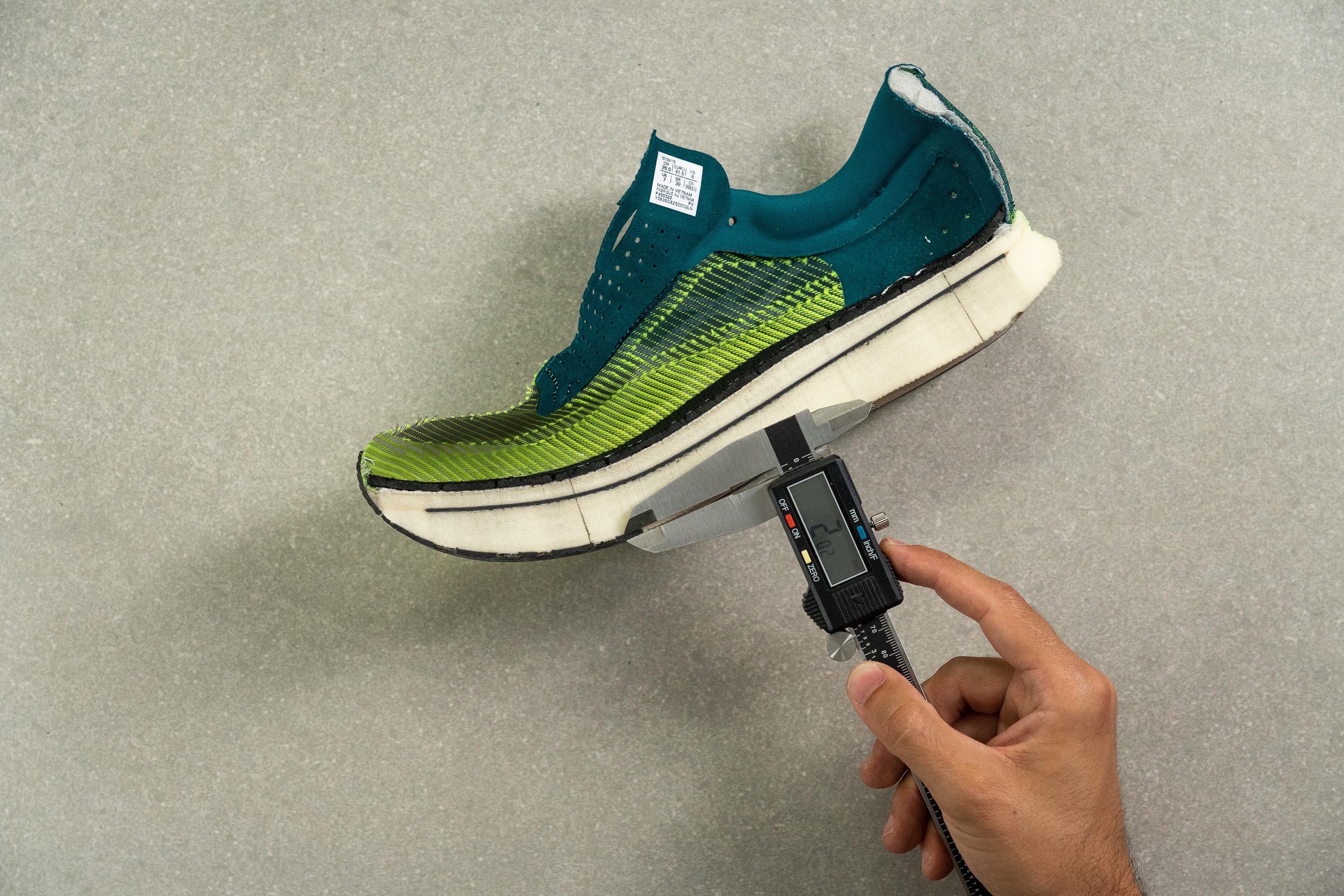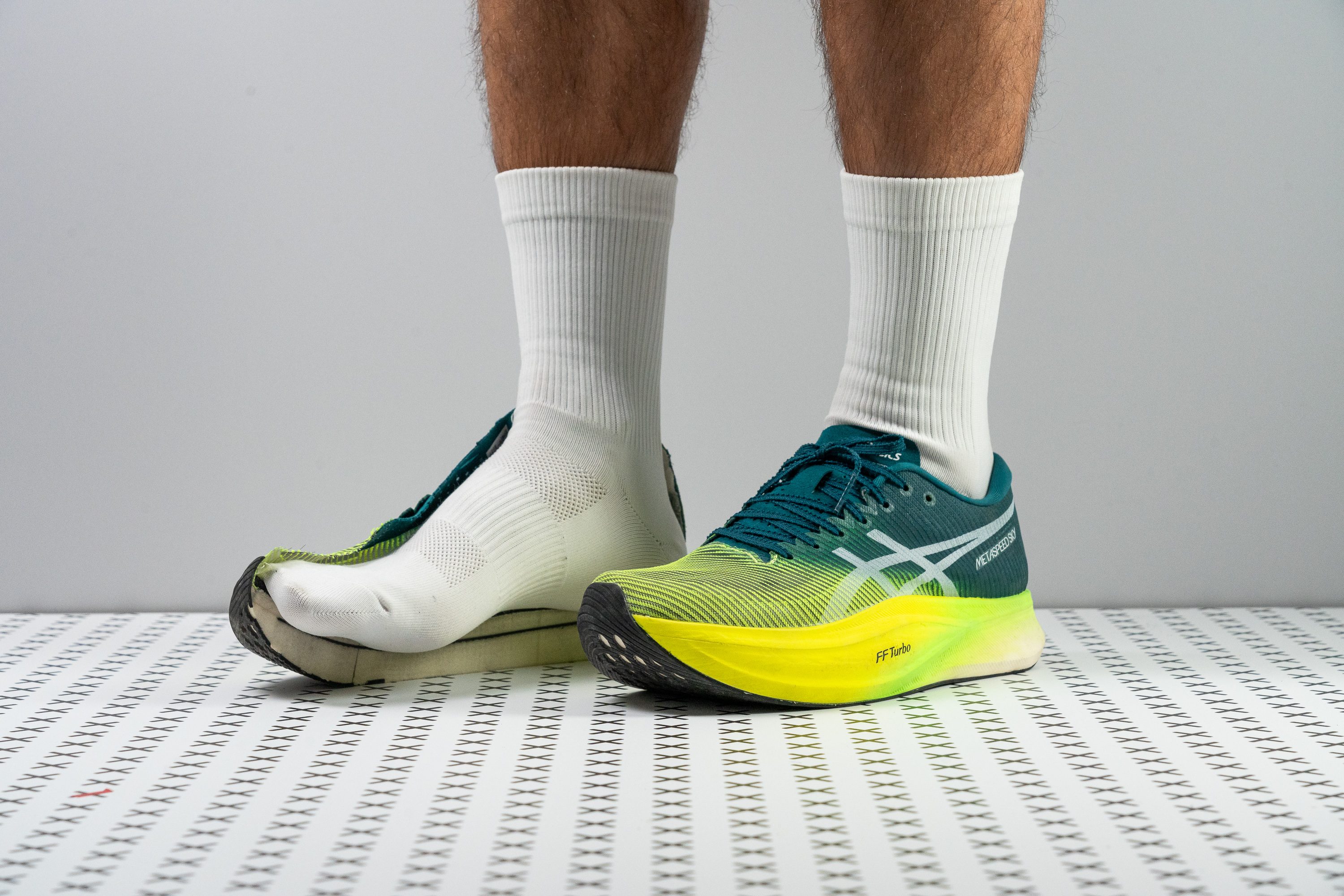Our verdict
- Top pick in best low drop running shoes (2024)
- Top pick in best competition running shoes (2023)
Pros
- Fast as hell
- Buttery smooth transitions
- Stable when cornering
- Very very breathable
- Heel lockdown is awesome
- No more heel rubs
- Fits just right!
- Grippy on wet roads
Cons
- Stiffer than before
- Outsole lacks durability
- Expensive
Audience verdict
- Top 8% in road running shoes
- Top 17% in ASICS running shoes
Comparison
The most similar running shoes compared
+ + Add a shoe | |||||
|---|---|---|---|---|---|
| Audience score | 91 Superb! | 90 Superb! | 92 Superb! | 92 Superb! | |
| Price | $250 | $260 | $250 | $250 | |
| Pace | Competition | CompetitionTempo | Competition | Competition | |
| Shock absorption | Moderate | - | - | - | |
| Energy return | High | - | - | - | |
| Traction | High | - | - | - | |
| Arch support | Neutral | Neutral | Neutral | Neutral | |
| Weight lab Weight brand | 7.2 oz / 205g 7.2 oz / 205g | 7.4 oz / 210g 8.1 oz / 229g | 7.3 oz / 208g 7.4 oz / 210g | 6.7 oz / 191g 7 oz / 198g | |
| Lightweight | ✓ | ✓ | ✓ | ✓ | |
| Drop lab Drop brand | 2.7 mm 5.0 mm | 3.7 mm 0.0 mm | 8.1 mm 8.0 mm | 2.5 mm 5.0 mm | |
| Strike pattern | Mid/forefoot | Mid/forefoot | HeelMid/forefoot | Mid/forefoot | |
| Size | True to size | Half size small | True to size | True to size | |
| Midsole softness | - | Balanced | Firm | - | |
| Difference in midsole softness in cold | - | Small | Small | - | |
| Toebox durability | - | Bad | - | - | |
| Heel padding durability | Good | Good | - | - | |
| Outsole durability | - | Decent | - | - | |
| Breathability | Breathable | Breathable | Breathable | Breathable | |
| Width / fit | Narrow | Medium | Narrow | Narrow | |
| Toebox width | - | Wide | - | - | |
| Stiffness | Stiff | Stiff | Stiff | - | |
| Torsional rigidity | Stiff | Stiff | Stiff | Stiff | |
| Heel counter stiffness | Flexible | Flexible | Flexible | - | |
| Plate | Carbon plate | Carbon plate | Carbon plate | Carbon plate | |
| Rocker | ✓ | ✓ | ✓ | ✓ | |
| Heel lab Heel brand | 33.5 mm 39.0 mm | 33.1 mm 36.0 mm | 33.3 mm 39.0 mm | 33.7 mm 33.0 mm | |
| Forefoot lab Forefoot brand | 30.8 mm 34.0 mm | 29.4 mm 36.0 mm | 25.2 mm 31.0 mm | 31.2 mm 28.0 mm | |
| Widths available | Normal | Normal | NormalWide | Normal | |
| Orthotic friendly | ✗ | ✓ | ✗ | ✗ | |
| Season | SummerAll seasons | SummerAll seasons | SummerAll seasons | SummerAll seasons | |
| Removable insole | ✗ | ✓ | ✗ | ✗ | |
| Ranking | #25 Top 7% | #68 Top 18% | #21 Top 6% | #15 Top 4% | |
| Popularity | #125 Top 33% | #207 Bottom 45% | #198 Bottom 48% | #64 Top 17% |
Cushioning
Shock absorption
Any modern super shoe needs strong shock absorption to handle a full marathon, and the Metaspeed Sky+ delivers with 130 SA. We wouldn’t mind a touch more, but in our view, it gets the job done.
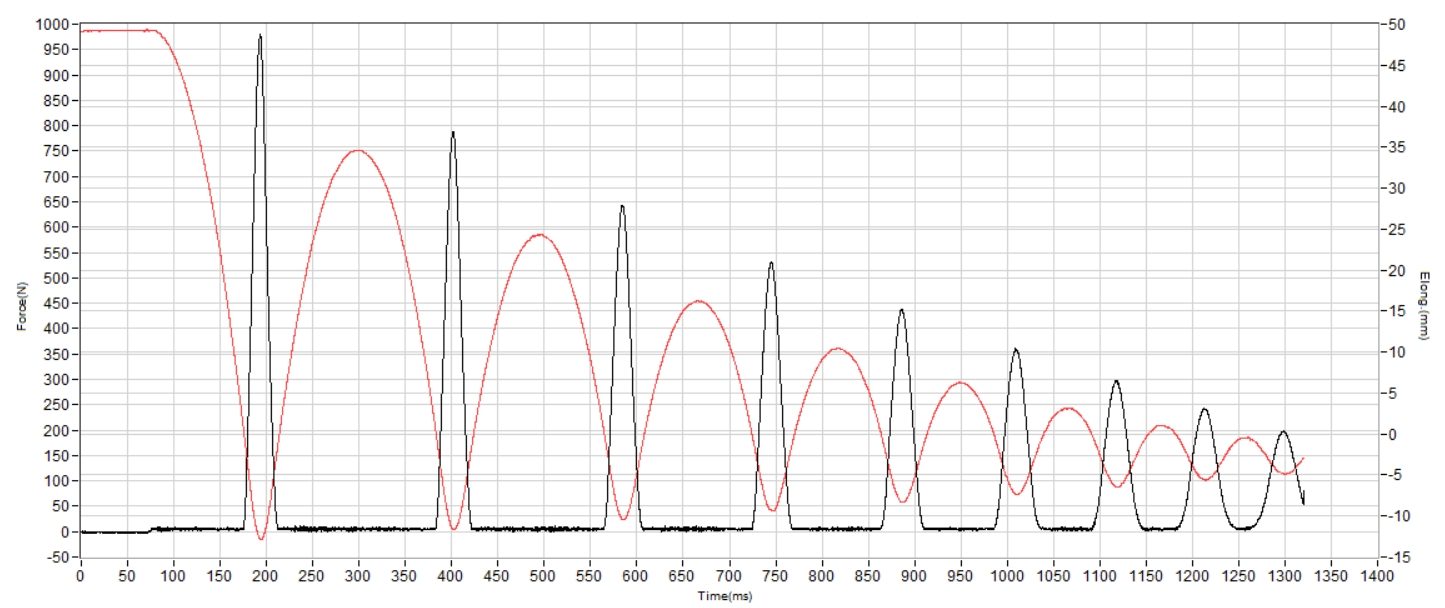
| Metaspeed Sky+ | 130 SA |
| Average | 130 SA |
Energy return
The FF Turbo foam in the Sky+ does an excellent job of giving back most of the energy you put into the midsole. Specifically, it returns 70.1% in the heel and 74.4% in the forefoot—a first sign (with more to come) that this shoe suits midfoot and forefoot strikers far better.
| Metaspeed Sky+ | 70.1% |
| Average | 58.6% |
Size and fit
Size
ASICS Metaspeed Sky+ fits true to size (122 votes).
Traction / Grip
Traction test
We tested the Metaspeed Sky+ in the lab using our wet-condition setup, and ASICS absolutely nailed it with a stellar 0.84 score. Even with minimal rubber coverage, this outsole delivers grip-loaded performance on soaked concrete.
Naturally, if it sticks this well in wet, grip in dry conditions feels even more secure. In fact, this is one of the few super shoes we’ve tested that delivers this kind of rain-ready traction without compromise.
| Metaspeed Sky+ | 0.84 |
| Average | 0.49 |
Flexibility / Stiffness
With its above-average forefoot stack and a carbon plate moved closer to the top, the Metaspeed Sly+ offers a rather stiff forefoot experience, even for a race shoe.
We're talking 70%(!) stiffer than the average! This ASICS shoe required as much as 25.3N of force to bend by 30 degrees.
| Metaspeed Sky+ | 25.3N |
| Average | 15.3N |
Who should buy the ASICS Metaspeed Sky+
We suggest adding the Metaspeed Sky+ to your buy list if you're craving a:
- fast and fun carbon-plated running shoe for half to full-marathon distances
- racing flat that can also double as a tempo-day trainer
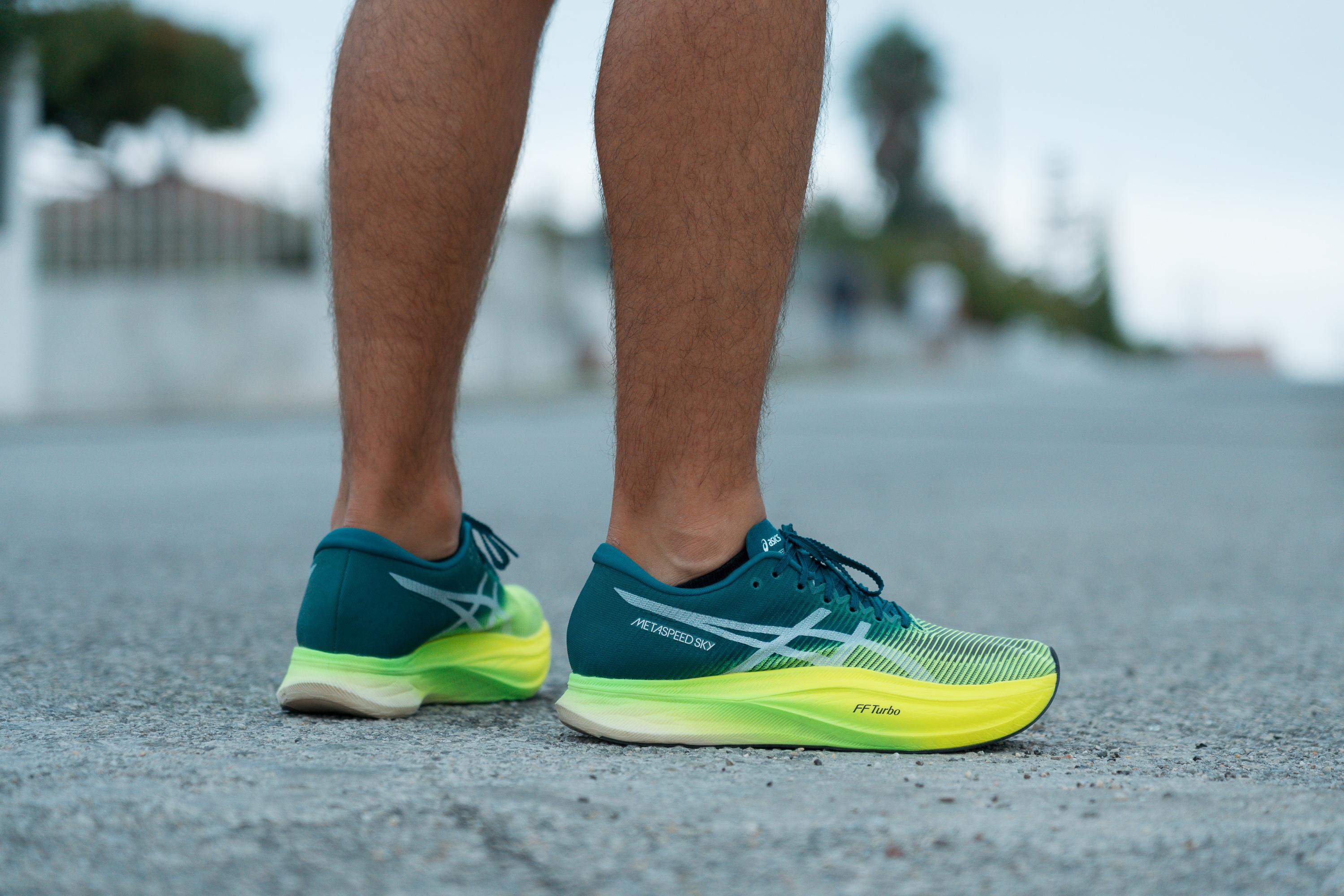
Who should NOT buy it
Since the carbon-fiber plate of the shoe has been moved higher up to be closer to the runner's foot, the ASICS Sky+ can feel a tad stiffer. This said, you can opt for the first version instead—ASICS Metaspeed Sky. Alternatively, we highly recommend the PUMA Deviate Nitro Elite 2. Even better, it's more durable.
ASICS Metaspeed Sky+ vs. Metaspeed Sky
If you loved the ASICS Metaspeed Sky, then you're in for a treat in the ASICS Metaspeed Sky+. This time around, minor touch-ups done on the original make it an even better marathon shoe:
- a snappier ride resulting from moving the carbon-fiber plate closer to the foot
- a new softer mesh upper amps up comfort
- more accommodating toebox
- smoother and finer in-shoe lining
- redesigned heel cap supports the foot better
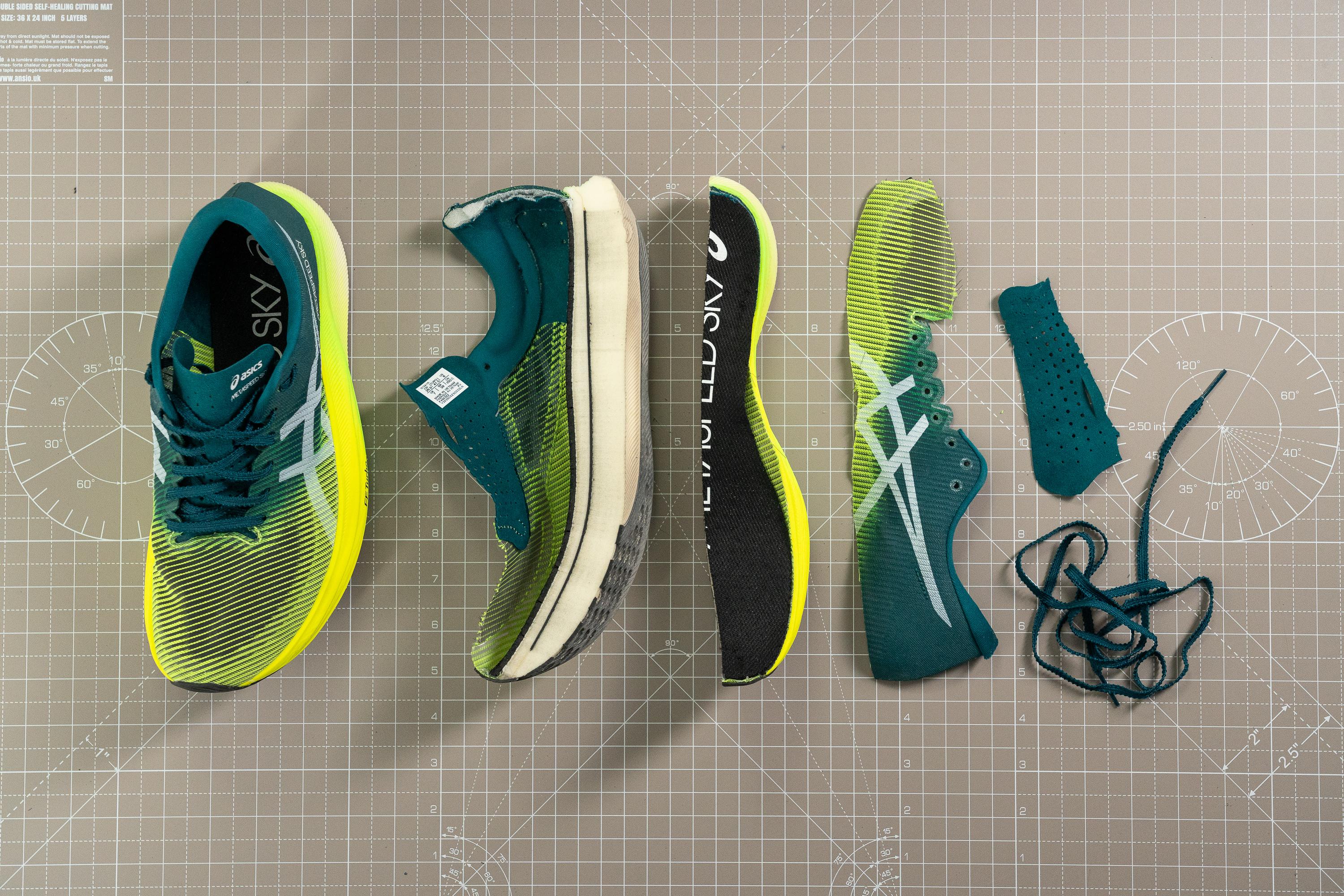
A speed expert
Overall, the Metaspeed Sky+ is designed to help you feel your fastest. Its now-repositioned carbon-fiber plate creates a snappier toe-off.
Checking the heel stack (33.5 mm with the insole included), we don't see any difference from the original Metaspeed Sky (33.7 mm). It is still a considerable amount of cushioning, which puts the Sky+ into the max-cushioned range.
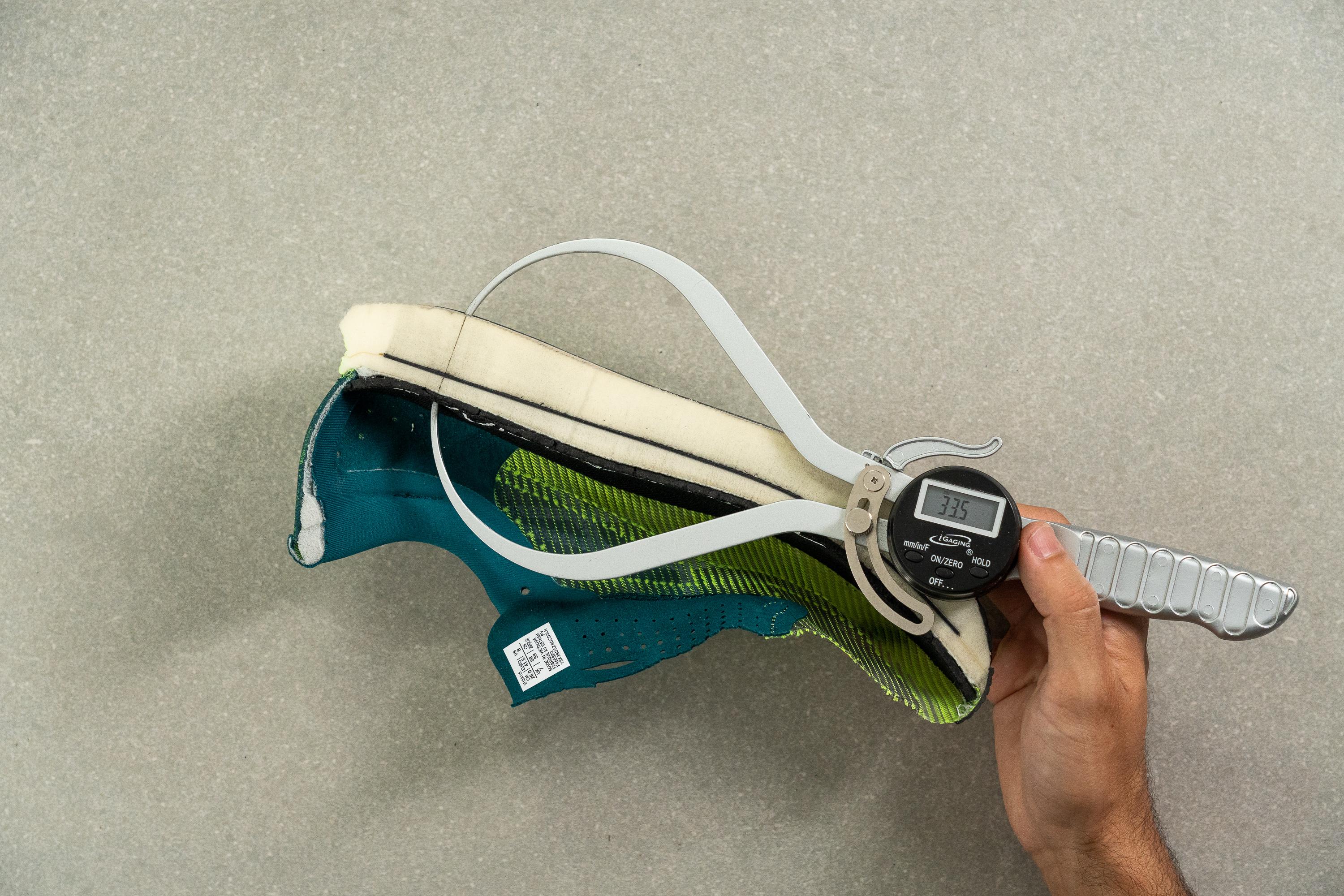
On top of this, the shoe has a very smooth heel-to-toe transition, and picking up the pace in it is a real blast!
As light as light can be
Although it's heavier than the original Metaspeed Sky by 38 grams/1.3 ounces we still find it very light. That's because the shoe is still lighter than the average racer (205 grams/7.2 ounces vs. 215 grams/7.6 ounces in US men's 9).
Compared to other plated shoes (227 grams/8 ounces, on average), it's even lighter.
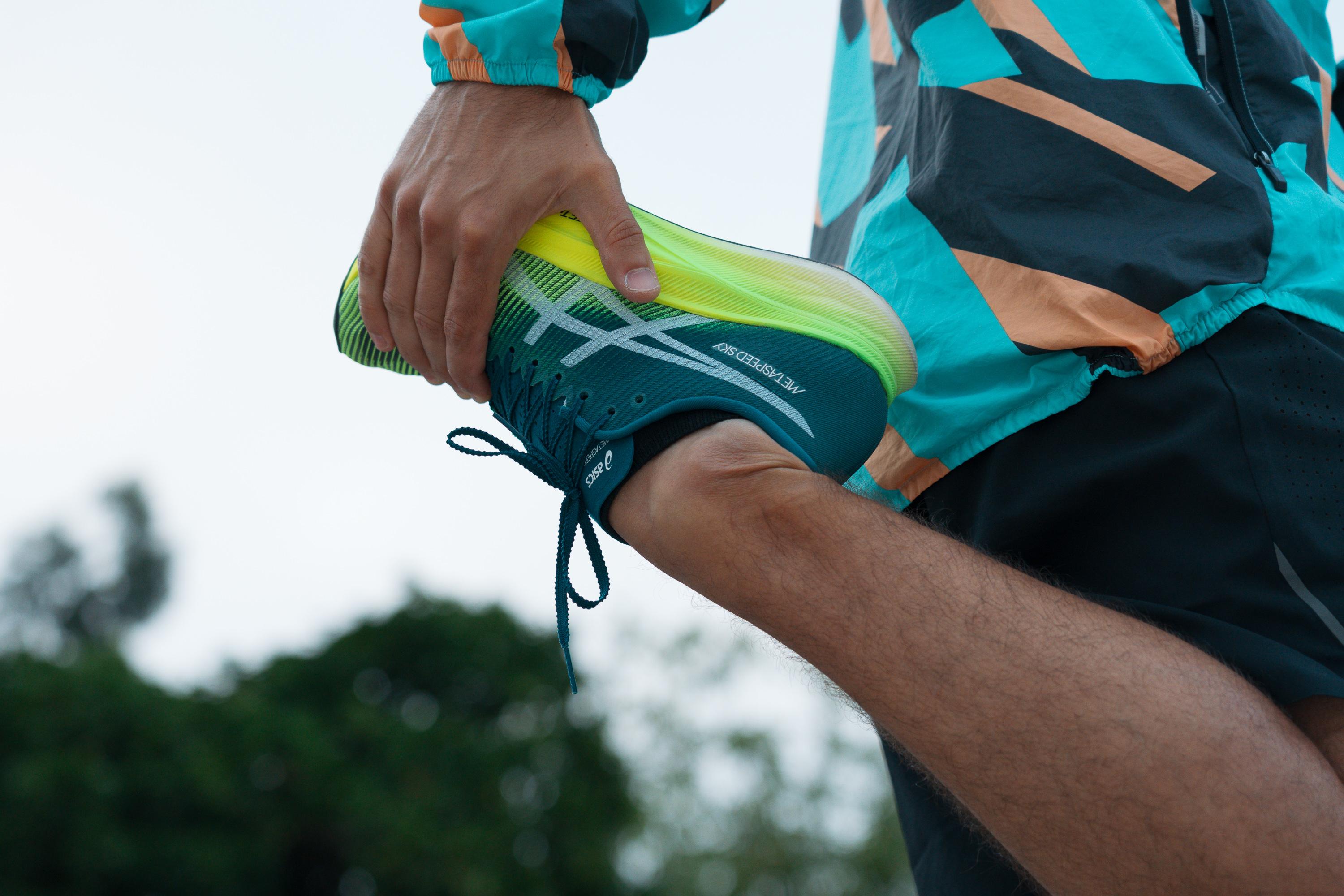
Long distances: Where it performs best
The ASICS Metaspeed Sky+ feels most at home at half-marathon and full-marathon distances. The shoe's forefoot bounce is felt more at these distances. And the added foam truly amps up the comfort and protection for the miles ahead.
Run with confidence in the ASICS Metaspeed Sky+
When it comes to support, lockdown, and stability, the Metaspeed Sky+ has fulfilled all of our expectations.
We never felt tippy nor did we have to worry about missteps in winding sections and cobblestones. We attribute that to the shoe's wider base and redesigned heel cap.
Looking at the base of the Metaspeed Sky+, the shoe's forefoot width (112.6 mm) proves to be within the average of road running shoes (113 mm).
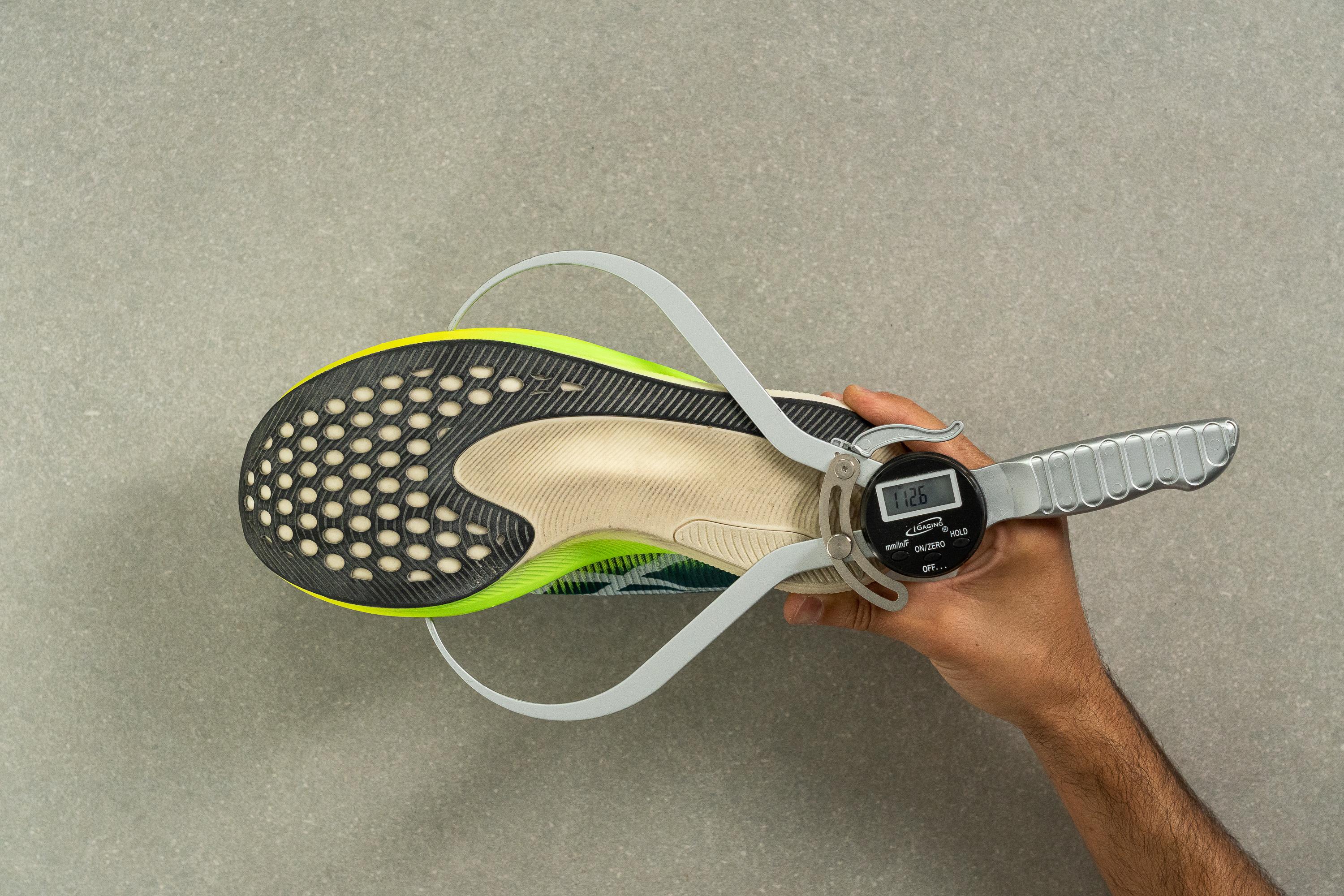
The heel deserves a thumbs-up
Speaking of the heel cap, it's made more supportive this time. It has more structure, thus creating a better lockdown in the rear. But that's not the only thing about it that's great. It also has a liner that feels smoother.
It's a small change but a very welcome one, especially if you had blister issues with the original Sky.
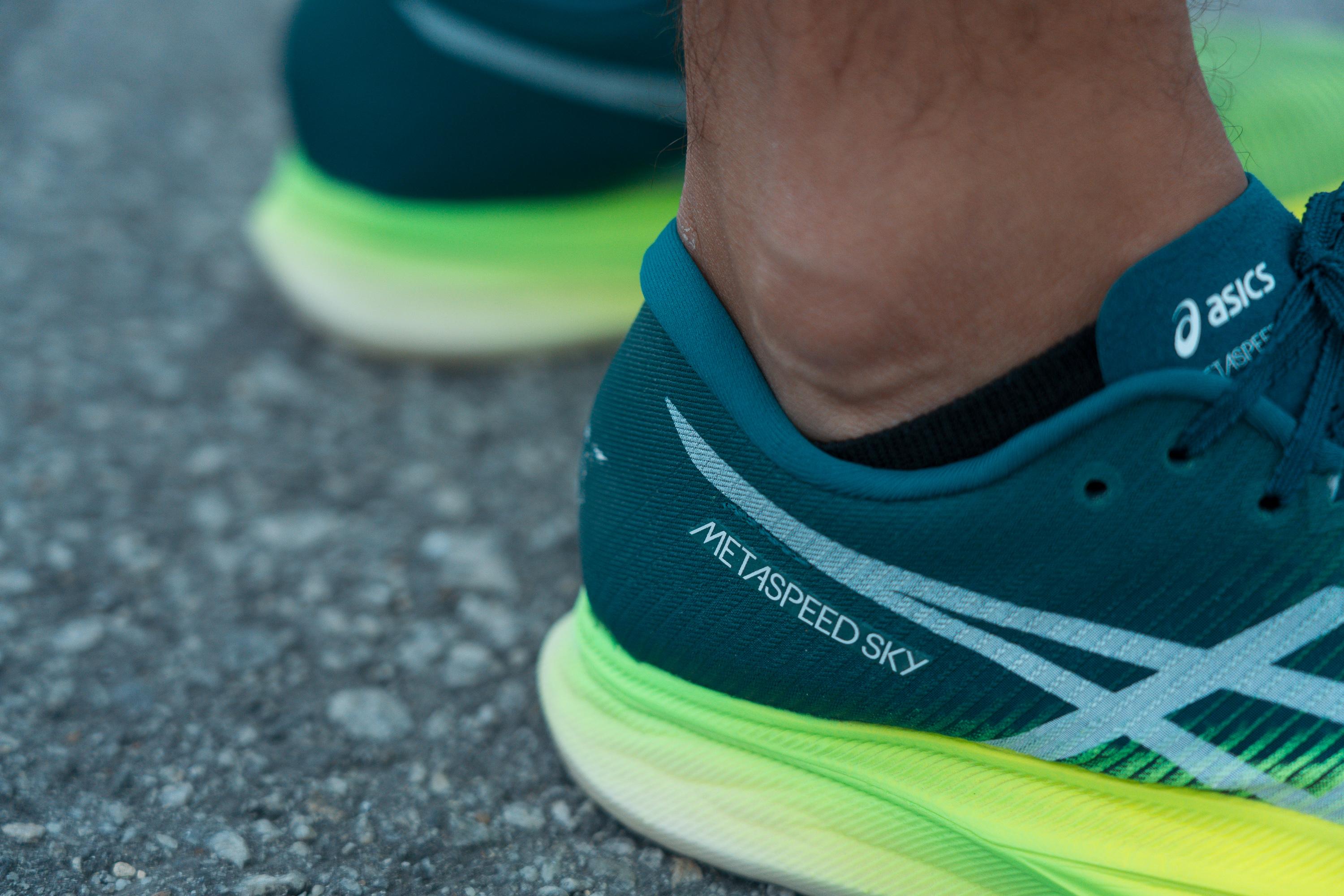
Experience pure goodness from the upper
The upper material creates a very comfortable wrap around the foot as far as a race shoe goes.
And it is also mind-blowingly breathable! See how quickly and easily the smoke passes through the shoe's mesh in our breathability test below:
Race fit that's not harsh
The MetaSpeed Sky+ has a pretty snug, one-to-one fit.
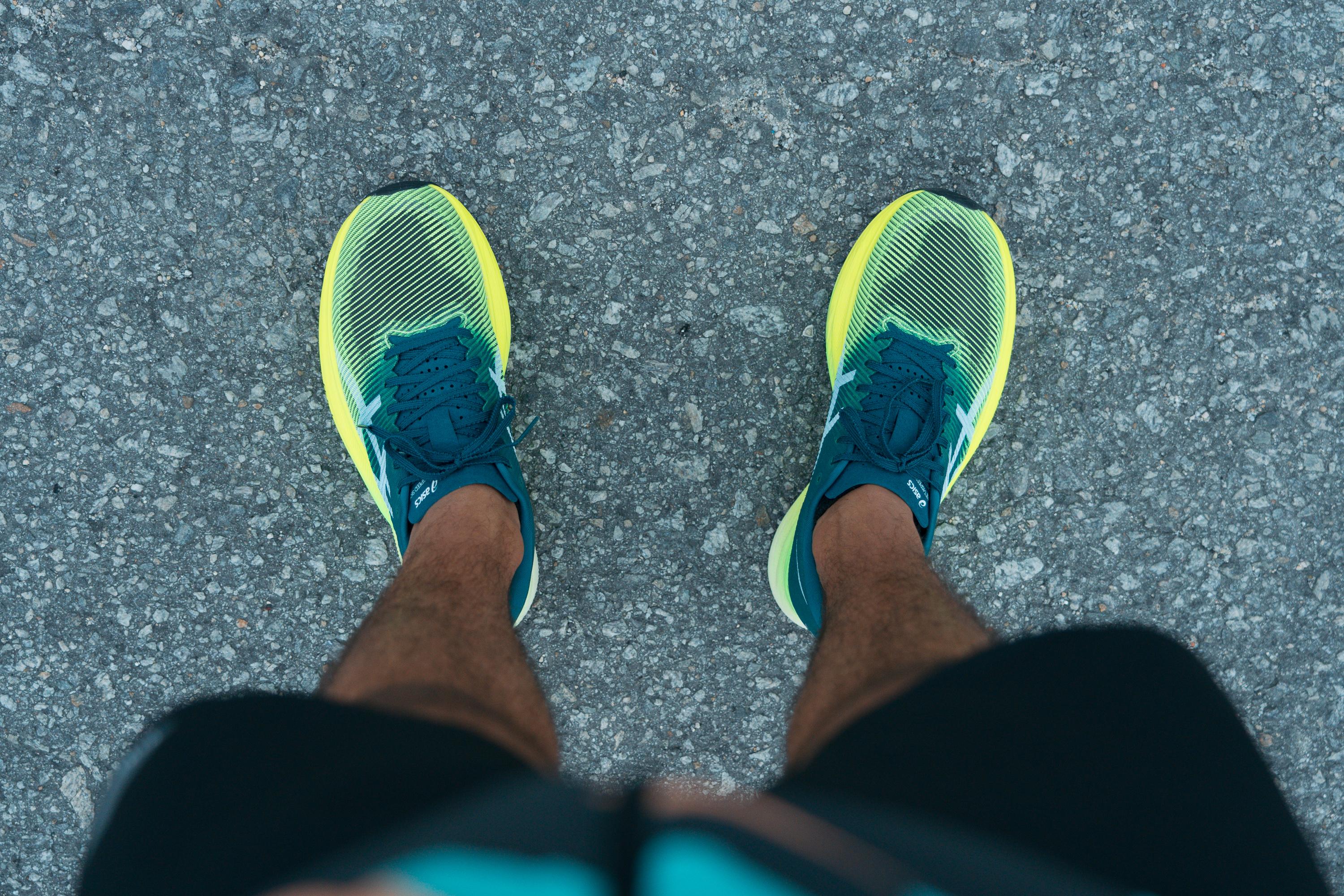
Measuring the shoe's upper at its widest area (92.2 mm), we can confirm that this ASICS shoe is not wide enough to impress someone with wider feet given that the average among our lab-tested shoes is 98.5 mm.
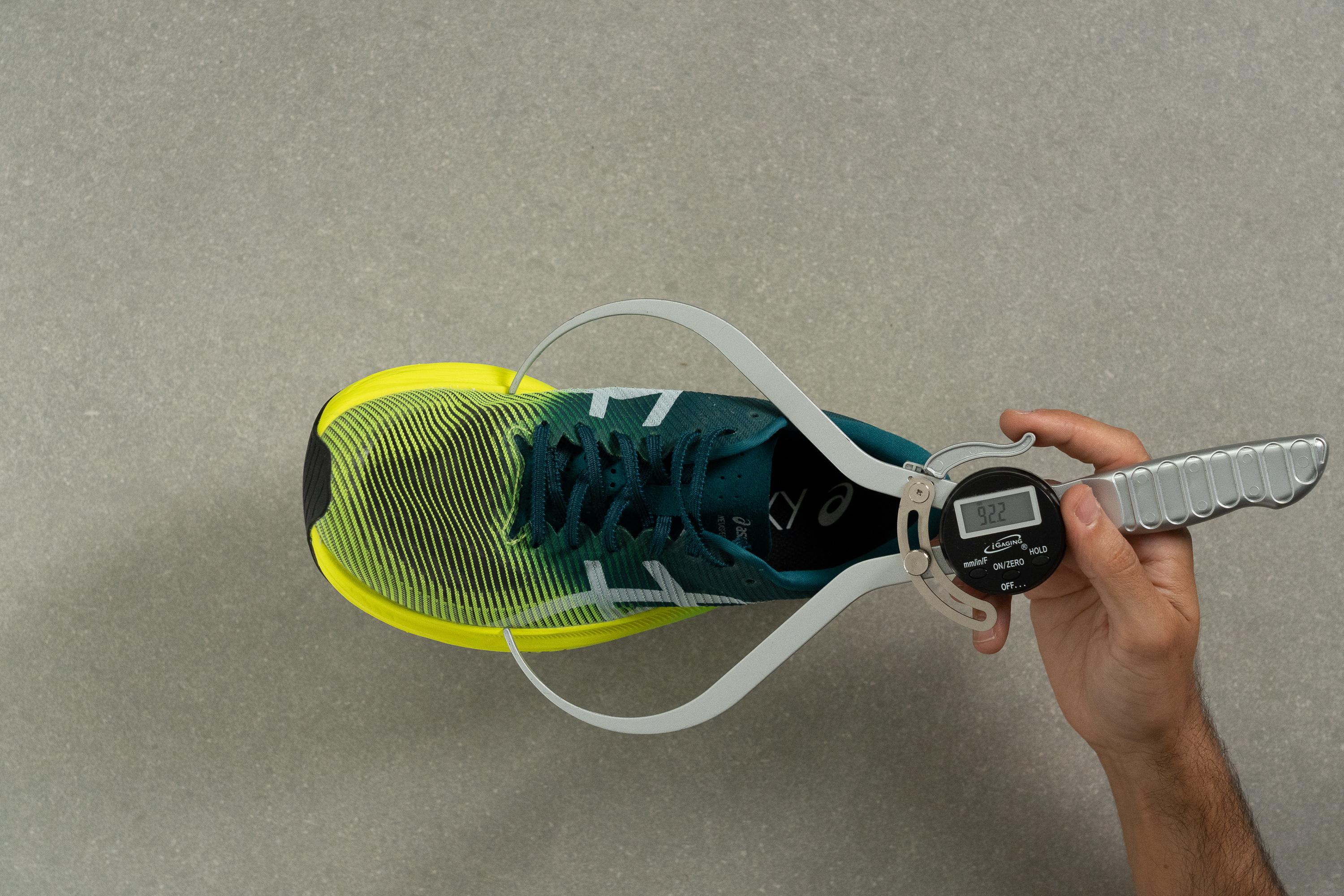
But there is a silver lining in the form of more space in front and on top of the toes. It is noticeably less restricting than the first MetaSpeed Sky.
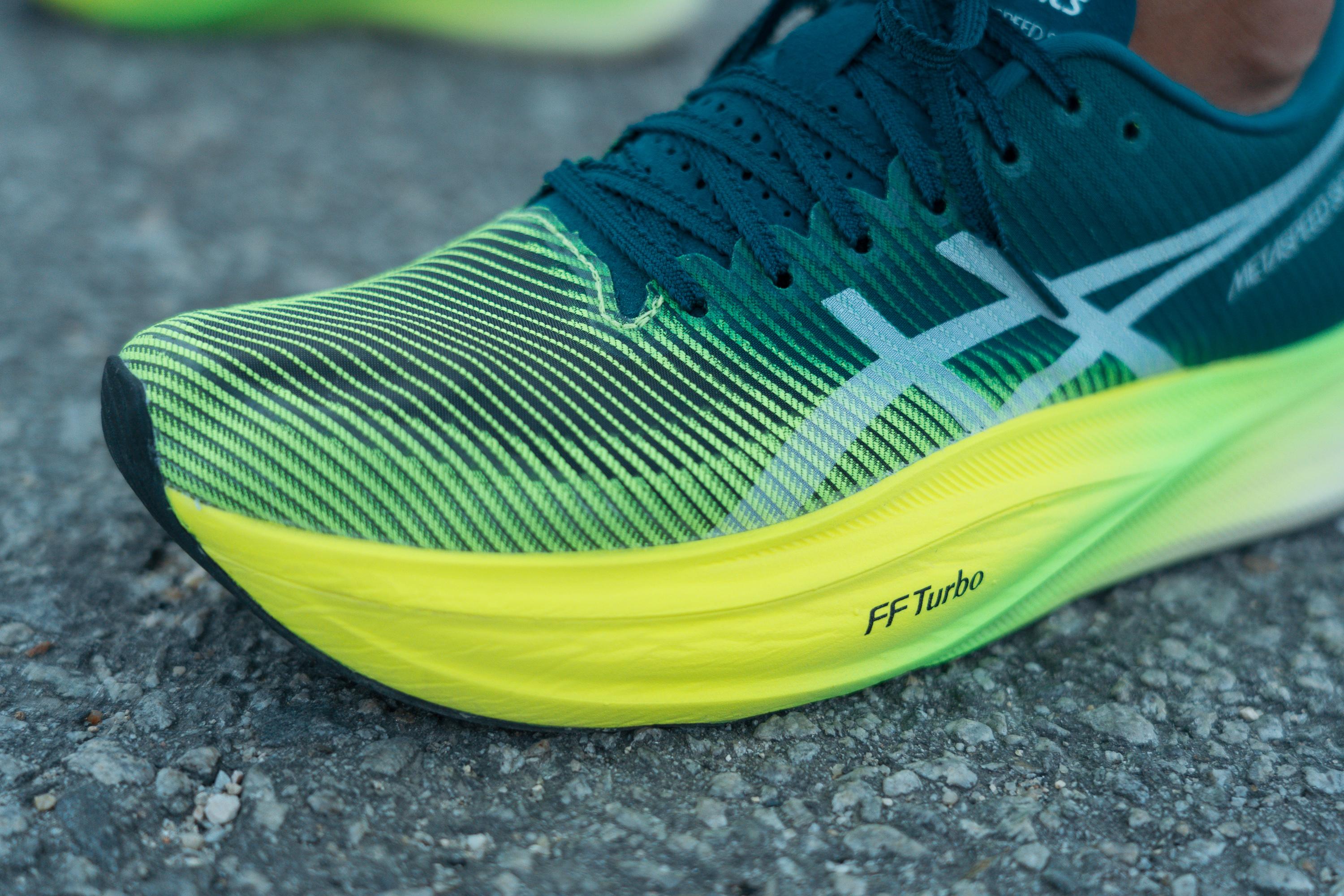
The outsole has to be better for this price
It's darn expensive at $250! That's for sure. On average, carbon-fiber plated running shoes cost $204 a pair while racing flats, on average, cost $145 per pair. You have to be willing to pay that much for a shoe that's only good for a race day due to its lack of outsole durability.
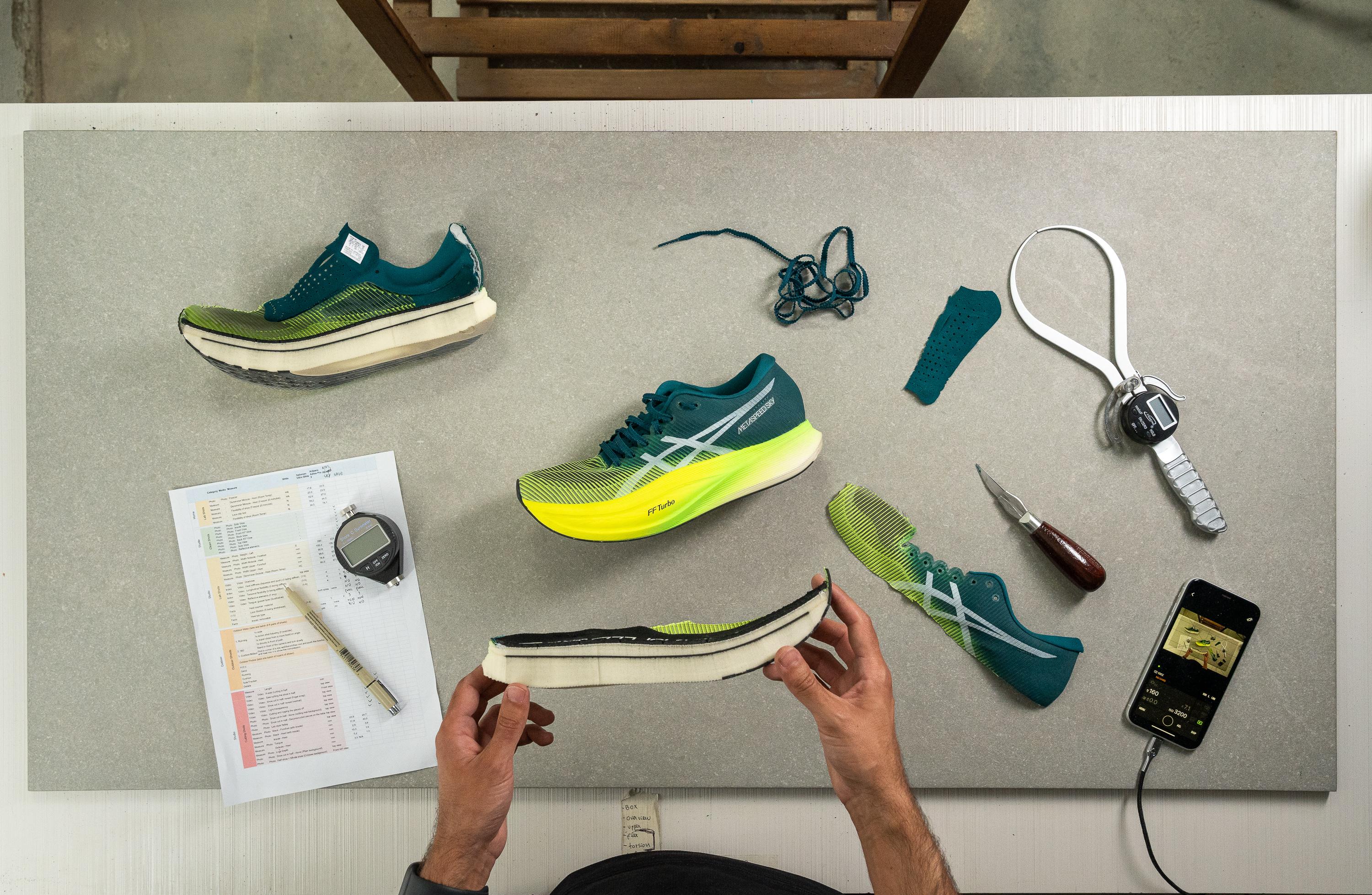
There's just not a lot of rubber coverage for it to last a long time. The rubber layer covering the shoe's forefoot and part of the lateral side is indeed thin. We measured it at 2.0 mm which is less than the average 3.5 mm.
